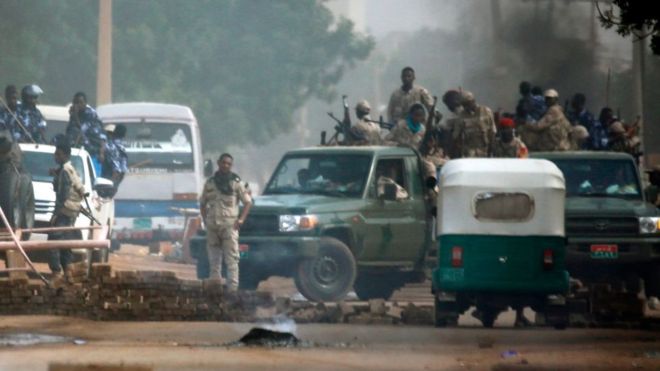Sudan crisis: More than 60 killed, opposition says

Security forces, seen here on Monday, moved against protesters after a long stand-off
The number of protesters killed in Sudan has risen to 60, an opposition doctors’ group says, as paramilitary forces push deeper into Khartoum.The revised death toll came after two days of unrest which began when forces of the Transitional Military Council (TMC) fired on unarmed protesters.
Members of a feared paramilitary group have reportedly been roaming the streets attacking civilians since.
The military has faced international condemnation for the deadly crackdown.However, an attempt by the UK and Germany at the UN to call on the Sudanese military to work towards finding a solution was blocked by China, who were backed by Russia.
Demonstrators had been occupying the square in front of the military headquarters since 6 April, five days before President Omar al-Bashir was overthrown after 30 years in power.Their representatives had been negotiating a deal with the TMC, and had greed a three-year transition, culminating in elections.But on Monday, forces moved in to forcibly move the protesters from the square.
Many Khartoum residents blamed the Rapid Support Forces for the crackdown. The paramilitary unit – formerly known as the Janjaweed – gained notoriety in the Darfur conflict in western Sudan, which began in 2003.The TMC then announced polls would be held within nine months. The demonstrators had argued that a longer period was needed in order to guarantee fair elections and dismantle the political network associated with the former government.
Sudan’s military has faced international condemnation for its attack, but there were signs it could have happened. The country has been driven backwards by a military elite intent on holding on to power.The TMC has scrapped agreements reached with the opposition Forces of Freedom and Change (FFC), saying this will speed up the transition to democratic elections. That plan is likely a fiction.
The military also enjoys another advantage: in an age of international division, the notion of an “international community” pressuring the regime is fantasy. Sudan’s crisis has exposed the reality of international politics: that force can have its way, without consequence, if the killers and torturers represent a valuable asset to other powers.
It is impossible to say whether the FFC can come back as a street-driven force. What will not change, in fact what has been deepened, is the alienation of people from their rulers.The protesters had called for the Islamic festival of Eid al-Fitr, marked on Tuesday and Wednesday this week, to be celebrated in the streets, as a gesture of defiance against the military.
On Tuesday, however, much of Khartoum seemed to be under lockdown. Video shot on mobile phones showed columns of troops advancing along the streets, removing barricades and firing into the air.One resident, who wanted to remain anonymous for her own safety, told the BBC of a city in fear as reports of atrocities spread.
Her uncle had witnessed three young men being executed in the city, she said.”We’re living like hostages, no one can get out,” she said, adding that the internet is blocked.Flights into Khartoum have also been disrupted.
Much of Khartoum was deserted on Tuesday, as security forces spread across the city.Large numbers of heavily armed troops were also reported on the streets of Omdurman, Sudan’s second-largest city, just across the River Nile from Khartoum.A woman, identified only as Sulaima, told that troops from the Rapid Support Forces were “all over Khartoum”.”They’re surrounding neighbourhoods, they’re threatening people. They’re also using live ammunition. They’re everywhere. We’re not feeling safe and we don’t have trust in the security forces. It’s complete chaos.”
Earlier, Gen Abdel Fattah al-Burhan, the TMC head, said on state television the council had decided to “stop negotiating” with the protesters and “cancel” all previous agreements, and that an election would be held in nine months.The US, the UK and Norway expressed “serious concern” over the announcement, and called for “an agreed transfer of power to a civilian-led government”.
The security services moved on the main protest site early on Monday and, according to activists, forces also surrounded a hospital in Khartoum and opened fire at another.In a statement read on national television, the military council said the operation had targeted “trouble makers and petty criminals” and that they were dedicated to protecting civilians.
The Sudanese Professionals Association (SPA), which is spearheading the nationwide protests, responded by calling for a campaign of “sweeping civil disobedience to topple the treacherous and killer military council”.
19 December 2018 – Protests erupt after fuel and bread price rises announced
22 February 2019 – President Bashir dissolves the government
24 February – Protests continue as security forces respond by firing live bullets
6 April – Activists begin sit-in at military headquarters, vowing not to move until Mr Bashir steps down
11 April – Army generals announce that Mr Bashir has been toppled but sit-in continues as people demand civilian rule
20 April – Talks between the military rulers and civilian representatives begin
13 May – Shooting outside the military headquarters leaves six people dead
14 May – Military and civilians announce a deal on a three-year transition period
16 May – Talks postponed as military demands some barricades are removed
3 June – Activists announce the suspension of talks with the military, accusing them of using force to disperse their sit-in
The analyst and former British ambassador to Sudan, Rosalind Marsden, said the snap election would “simply pave the way for much of the old regime to come back into power”.”There’s a real risk of violence continuing,” she said.
The UN urged the Sudanese authorities to facilitate an independent investigation and to hold those responsible accountable.





